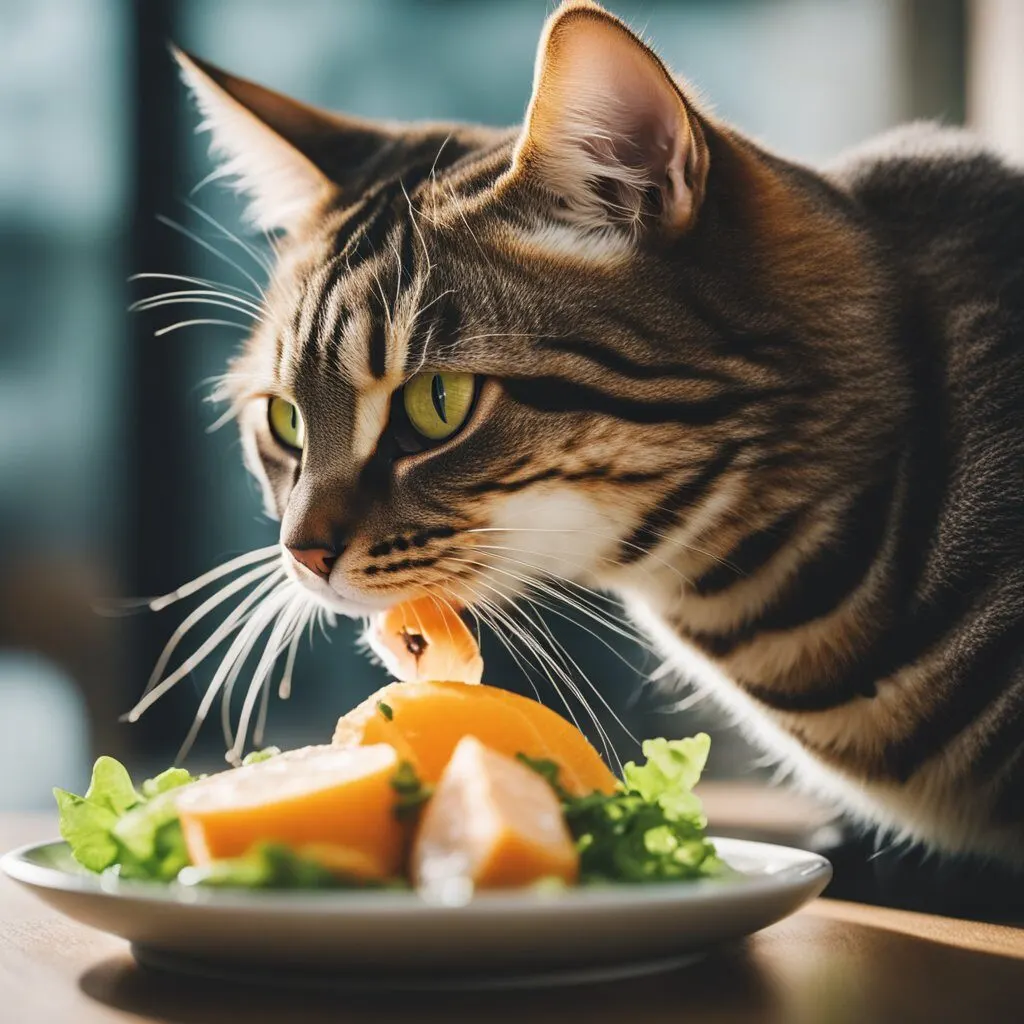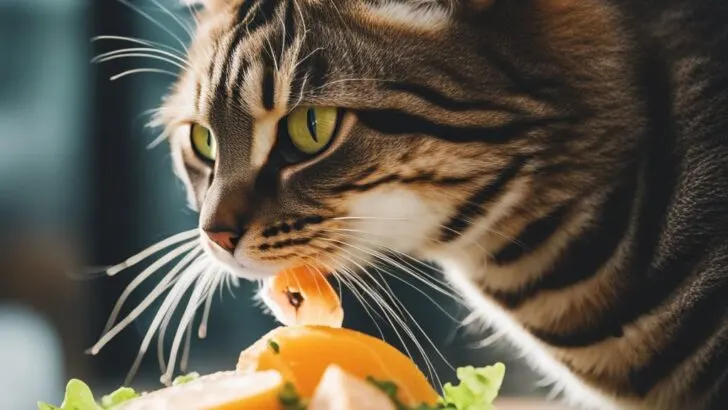Cats can eat fish with bones, but whether they should is a different matter. In the wild, cats might chow down on a whole fish, bones and all, utilizing their strong jaw and sharp teeth to crunch through their prey.
It’s a natural behavior for them—wild felines aren’t picky and will consume most parts of their catch to get the full nutritional benefit. Domestic cats retain many of these instincts and abilities despite their luxurious home life.

However, when it comes to our domesticated furry friends, we need to be a bit more cautious. Although cats are adept at handling raw bones, the risk comes when the bones are cooked.
Cooking changes the structure of fish bones, making them more brittle and thus more likely to splinter. These splinters can then become choking hazards or cause damage to your cat’s digestive tract.
Your primary focus as a cat owner is ensuring the safety and health of your feline. If you’re considering adding fish to your cat’s diet, it’s best to avoid giving them cooked bones. Instead, opt for deboned fish or specially prepared raw options that are suitable for pets.
How Cats Deal With Eating Fish
Feeding your cat fish can be a healthy addition to their diet due to the beneficial omega-3 fatty acids, proteins, and vitamins found in fish. However, it is crucial to be aware of how to do this safely to avoid health risks.

Risks of Feeding Fish with Bones
Choking Hazard: When it comes to feeding fish to your cat, one of the most significant risks is choking. Cats, whether wild or domesticated, are obligate carnivores which means they are adept at consuming small prey, including the bones.
However, domesticated cats might not be as used to processing bones as their wild counterparts. Cooked fish bones can be especially dangerous as they become brittle and can splinter, potentially causing choking or damaging the throat.
- Raw Bones: While raw bones are generally softer and less likely to splinter than cooked bones, they still present a choking risk and should be given with caution.
Health Issues: Besides choking, bones can cause other health issues. Fish bones can lead to obstructions in the digestive system or injuries inside your cat’s mouth. Moreover, feeding exclusively raw fish can cause thiamine deficiency, leading to serious neurological problems.
- Thiamine Deficiency: Thiamine, or vitamin B1, is crucial for your cat’s health, and enzymes in raw fish can destroy this vitamin.
- Food Poisoning: Just like humans, cats are susceptible to food poisoning from raw fish due to bacteria like salmonella.
Safe Fish Feeding Practices
Deboned Fish: To ensure safety, it is often recommended to feed your cat deboned fish. By removing all the bones, you can reduce the risk of choking and other related injuries. Regularly check the fish for any small bones you might have missed.
Cooked vs Raw Fish: Preferably, opt for cooking fish before feeding it to your cat. Cooking kills harmful bacteria and parasites, reducing the risk of food poisoning. Avoid seasoning the fish as certain spices can be harmful to cats.
Moderation is Key: Fish should not be the main component of your cat’s diet; it should instead complement a balanced diet, possibly consisting of commercial cat food that’s formulated to meet their nutritional needs.
Consult Your Veterinarian: It’s always best to consult with your veterinarian before introducing new foods into your cat’s diet. They can provide specific advice tailored to your cat’s health requirements.
You can safely incorporate fish into your cat’s diet, ensuring they reap the nutritional benefits without putting them at undue risk. Always keep an eye out during mealtime, and be prepared to respond promptly if your cat starts to choke.
Selecting and Preparing Fish for Your Cat
When choosing and preparing fish as a treat for your cat, safety and nutrition are paramount. The right selection and cooking method can provide your cat with a tasty snack that is also rich in essential nutrients.
Choosing the Right Fish
Selecting fish for your cat involves considering both the type of fish and its source. Tuna, salmon, sardines, and mackerel are commonly fed to cats due to their high content of omega-3 fatty acids, which are beneficial for your cat’s coat and overall health.
However, it is crucial to be aware of the mercury and heavy metals that fish can contain. Smaller fish like sardines and mackerel typically have lower levels of mercury compared to larger fish like tuna and salmon.
- Tuna: High in omega-3 but feed in moderation due to mercury content.
- Salmon: Rich in nutrients but ensure it’s fresh and clean.
- Sardines: Typically safer regarding mercury; a good source of omega-3 and 6.
- Mackerel: Nutritious, yet check for freshness and mercury content.
Preparation and Cooking Tips
Cooking fish for your cat is essential as it destroys harmful bacteria and softens the bones to reduce the risk of choking or internal damage.
Never feed raw fish to your cat due to potential bacteria and the presence of thiaminase, an enzyme that breaks down thiamine (an essential vitamin for cats), leading to a deficiency. Cook fish thoroughly, without added fats, oils, or seasonings that can upset your cat’s stomach.
Proper Cooking Steps:
- Debone: Always choose boneless fish or meticulously remove bones.
- Cooking: Bake fish at 400 degrees Fahrenheit for 10-12 minutes.
- Texture: Ensure the fish is tender but not too flaky to prevent choking.
Tip: Wrapping fish in parchment paper keeps it moist during cooking.
Fish Alternatives and Supplements
While fish can be a good source of certain nutrients, relying solely on fish can lead to nutritional imbalances. Consider varying your cat’s diet with commercial cat foods that are specifically formulated to meet all their nutritional needs.
These foods often contain the right balance of fats, minerals, and vitamins. If you’re looking for a supplement, high-quality omega-3 and omega-6 fatty acid supplements designed for cats can be a safer option than fish.
- Commercial Cat Food: Choose one with a complete nutritional profile.
- Supplements: Consult your veterinarian for appropriate omega fatty acid supplements.
- Alternatives: Cooked chicken, turkey, or lean meats can be good protein sources without the risks associated with fish bones.
Incorporating fish into your cat’s diet can be beneficial if done correctly, but always proceed with care to avoid digestive issues such as vomiting, loss of appetite, or worse.

My name is James, and welcome to FAQCats!
Along with our team of cat owners, expert pet enthusiasts, and pet professionals, we aim to write engaging helpful, engaging content about cats. At FAQCats we strive to provide content that’s accurate and fun to read. Our team writes about everything related to cats; even the most complex of topics. Through extensive research and caring for our own fur-pals, we’re able to provide something cat owners worldwide will love. Have a look around, and leave us feedback anytime!

